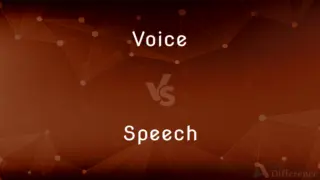Hey vs. Hai — What's the Difference?
By Fiza Rafique & Maham Liaqat — Updated on May 18, 2024
"Hey" is an informal greeting commonly used in English, while "hai" is a Japanese word meaning "yes" or an affirmative response.

Difference Between Hey and Hai
Table of Contents
ADVERTISEMENT
Key Differences
"Hey" is an informal greeting used in English to attract attention, start a conversation, or greet someone casually. It is versatile and can be used in various contexts, such as saying "Hey, how are you?" or simply "Hey!" to get someone's attention. "Hai," on the other hand, is a Japanese word that translates to "yes" in English. It is used to show agreement, acknowledgment, or affirmation in response to a question or statement. For instance, if someone asks in Japanese, "Are you ready?" ("準備はできましたか?"), you would respond with "Hai" ("はい").
"Hey" functions primarily as a greeting or attention-getter in English, while "hai" serves as an affirmative response in Japanese. They differ not only in usage but also in linguistic and cultural contexts, with "hey" being part of casual English communication and "hai" integral to Japanese conversational etiquette.
Comparison Chart
Language
English
Japanese
Meaning
Informal greeting
Yes, affirmative response
Usage
To greet or attract attention
To show agreement or acknowledgment
ADVERTISEMENT
Common Context
Casual conversations
Everyday Japanese conversations
Tone
Friendly, casual
Polite, affirming
Compare with Definitions
Hey
Informal exclamation.
Hey! Watch out!
Hai
Acknowledgment of understanding.
Hai, I understand.
Hey
Friendly salutation.
Hey there, nice to see you!
Hai
Showing readiness.
Hai, I'm ready.
Hey
Informal greeting.
Hey, how's it going?
Hai
Confirmation.
Hai, I received the message.
Hey
Attention-getter.
Hey, look at this!
Hai
Agreement to a statement.
Hai, that’s correct.
Hey
Start of a conversation.
Hey, do you have a minute?
Hai
Yes, affirmative response.
Q: Are you coming? A: Hai.
Hey
Used to attract attention, to express surprise, interest, or annoyance, or to elicit agreement
Hey, what's going on here?
Hai
(Internet slang) hi
Hey
Used to attract attention or to express surprise, appreciation, wonder, or pleasure
"Oh, hey, you saw that ninety-nine-yard punt return in the Super Bowl? Wow, so did I!" (Don Pfarrer).
Hey
Used to express greeting.
Hey
An exclamation to get attention.
Hey, look at this!
Hey! Listen!
Hey
A protest or reprimand.
Hey! Stop that!
Hey
An expression of surprise.
Hey! This is new!
Hey
An informal greeting, similar to hi.
Hey! How's it going?
Hey
A request for repetition or explanation; an expression of confusion.
Hey? How's that?
Hey
A meaningless beat marker or extra, filler syllable in song lyrics.
The chorus is "nana na na, nana na na hey hey hey, goodbye".
Hey
(country dancing) A choreographic figure in which three or more dancers weave between one another, passing by left and right shoulder alternately.
Hey
Alternative spelling of he
Hey
High.
Hey
An exclamation of joy, surprise, or encouragement.
Hey
A cry to set dogs on.
Common Curiosities
What does "hai" mean?
"Hai" means "yes" or an affirmative response in Japanese.
What does "hey" mean?
"Hey" is an informal greeting or attention-getter in English.
Can "hai" be used to show readiness?
Yes, "hai" can indicate that someone is ready or prepared.
Is "hey" used in other languages?
While primarily English, "hey" is sometimes understood in other languages due to its casual nature in global contexts.
Is "hey" appropriate in professional settings?
Generally, "hey" is too informal for professional settings.
Is "hai" used only in conversations?
"Hai" is used in conversations and also in written responses to indicate agreement or acknowledgment.
Can "hey" be used to express surprise?
Yes, "hey" can also express surprise or sudden attention.
Can "hai" be used with elders?
Yes, "hai" is respectful and appropriate to use with elders in Japanese culture.
Can "hey" be used formally?
No, "hey" is typically used in informal contexts.
Is "hai" specific to Japanese culture?
Yes, "hai" is specific to Japanese language and culture, reflecting politeness and acknowledgment.
How do you respond to "hey"?
Responses can vary: "Hi," "Hello," or a continuation of the conversation, such as "Hey, what's up?"
Is "hai" used in formal situations in Japan?
Yes, "hai" is used in both formal and informal situations in Japan.
Can "hey" be considered rude?
"Hey" can be considered too casual or abrupt in certain formal or serious contexts.
Does "hai" always mean "yes"?
"Hai" generally means "yes," but it can also mean "I understand" or "I acknowledge" depending on the context.
Is "hey" used globally?
Yes, "hey" is widely understood globally due to its simplicity and informal use.
Share Your Discovery

Previous Comparison
Voice vs. Speech
Next Comparison
Convolute vs. InvoluteAuthor Spotlight
Written by
Fiza RafiqueFiza Rafique is a skilled content writer at AskDifference.com, where she meticulously refines and enhances written pieces. Drawing from her vast editorial expertise, Fiza ensures clarity, accuracy, and precision in every article. Passionate about language, she continually seeks to elevate the quality of content for readers worldwide.
Co-written by
Maham Liaqat











































